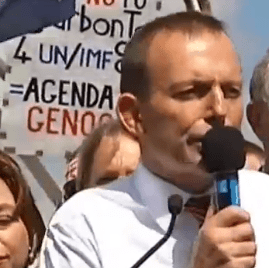Australia’s growing isolation on international climate policy has been highlighted after several European ambassadors broke with diplomat protocol and directly criticised Australia’s domestic policies.
The ambassadors, speaking at a function at ANU, said they were “surprised” and “shocked” that Australia was seeking to remove a carbon price and a market mechanism, and was not including environment issues on the G20 conference it is hosting later this year.
 “I’m amazed that a Liberal government does not choose a market mechanism to regulate emissions,” the Swedish ambassador Sven-Olof Petersson (pictured) said. “I think that is really shocking.”
“I’m amazed that a Liberal government does not choose a market mechanism to regulate emissions,” the Swedish ambassador Sven-Olof Petersson (pictured) said. “I think that is really shocking.”
Australia is not just seeking to remove the market price on C02 emissions, but conservative state governments are also dismantling market-based mechanisms to encourage energy efficiency, and have hired a climate skeptic to assess fossil fuel industry demands that the renewable energy target, another market mechanism that encourages wind and solar investment, is also removed.
As RenewEconomy reported from Warsaw last year, Australia’s about face on climate policies astonished international policy makers, and cast a pall over climate change negotiations.
The international community is also frustrated that Australia has refused to include climate change and other environmental concerns on the G20 agenda, apparently because Prime Minister Tony Abbott wants to keep the final communiqué “simple” and worries that climate change is too complicated.
“We were all a little bit surprised …that environment was not considered a priority issue,” Pier Francesco Zazo, Italy’s ambassador to Australia, told the same ANU forum. “Sooner or later Australia will go back to this … and understand the importance of the environment.”
Indeed, European leaders, and US President Barack Obama, have also put pressure on Australia to include climate change in the most important meeting of world leaders for the year.
The views of the ambassadors are widely held in international policy circles, but the fact that the ambassadors have spoken out on the matter so forcefully in the host country is highly unusual.
However, Australia is now being bombarded by warnings that its anti-environment, anti-climate stance risks economic problems further down the track.
Globally renowned economist Professor Jeffrey Sachs said this week that Australia’s reversal on climate change action will ultimately not stick, because the rest of the world will make clear that it is unacceptable.
Sachs said governments acting in an ”anti-scientific perspective or an extraordinarily short-term perspective” will be surprised by the response from other countries.
”This government was surprised this week with the reception to the budget,” Sachs told Fairfax Media. ”And I think it is going to be surprised by the global reception of its climate policies as well unless it begins to understand the real situation in the world and what’s really expected of a country like Australia.”
Earlier this week, Australian economist Ross Garnaut warned that Australia faced “consequences” in the international arena because of its position.
“The world is moving awkwardly towards much less carbon-intensive economic activity just as Australia is talking about moving the other way.
“This has the potential to generate tensions between Australia and important international partners and also to separate us from new opportunities in a low-carbon world.”
Australia’s federal environment minister Greg Hunt, when asked about the ambassadors’ comments, said he was not “aware” of their concerns, and repeated his off-stated comment that Australia was working to bring together the US, China, India and the EU (the so-called G4) to solve the climate problem.
India’s new PM has vowed to ensure that every home in the country (nearly 400 million have no access to electricity) will have solar by 2019, powering at least one light bulb. China this week said it would more than treble its solar capacity and double its wind capacity over the next four years. The US has flagged tighter emissions targets that will see more than 50GW of coal-fired generation closed, while Europe is looking to double its emissions target and raise its renewable energy targets.
The leaders of these countries are unlikely to want to be lectured by a junior minister who is overseeing the dismantling of the very policies that most major economies are looking to strengthen, and who is seeking to replace them with a budgeted $300 million to spend next financial year in a “Direct Action” plan dismissed as a joke by most financiers, and a 15,000-strong litter-collecting “green army.”






